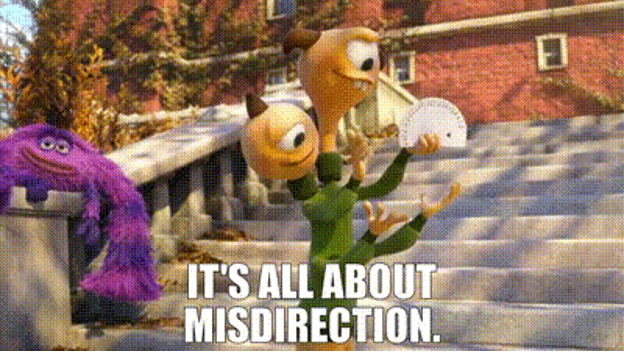Friendship is born the moment when one man says to another, “What! You too? I thought I was the only one.”
Howdy, this is UniScoops! We’re the newsletter that’s more refreshing than a cold can of Irn-Bru after PE.
So, without further ado…
Here’s a taste of what we’re serving today:
Where Are Women in Music 🤡
PLUS: Bringing Spotting Fake Art, Why We Sleep, and The Industrial Revolution 🏭
PSYCHOLOGY
Why Your Brain Loves Being Fooled 🤡

Ever wondered how the Four Horsemen keep pulling off their tricks in the Now You See Me movies? Well, wonder no more because the secret lies in the fascinating world of psychology. Today, we’re diving into how magicians manipulate our brains to create illusions that leave us in awe after every show.
💡 Things to consider
Misdirection of Attention: “Pay attention or you’ll miss the trick.” To understand how magicians manipulate their audience, we need to talk about attention. Attention has been crucial for human survival, helping our ancestors focus on tasks while staying aware of dangers. Given the numerous potential threats in nature, human attention is naturally limited and divided, and this weak spot is exactly the thing a magician needs to fool us. Magicians often misdirect your attention while performing a trick. For example, have you ever been asked to hold an object tightly during a performance? This directs the audience member’s full attention to that task, allowing the trick to happen elsewhere. They could also use external triggers, like a bright flash or a loud noise, to momentarily control the audience's attention.

Misdirection of Memory: Have you ever been asked to “Remember this card” during a magic trick? While it may seem easy at first, it quickly becomes challenging when you’re also asked to shuffle cards or watch the magician closely.
According to the Multi-store Model of Memory, our short-term memory has limited capacity. To keep a card or number in short-term memory, we rely on a rehearsal loop, repeating it sub-vocally like “Queen of Hearts, Queen of Hearts.” Without rehearsal, the information fades quickly, usually within 18 seconds. By asking you to memorize something while performing another task, magicians divide your mental resources, making it harder to figure out the trick. Additionally, our memory recall depends on the sequence of events. This is known as the “recency effect,” meaning the most recent items are most easily recalled. Magicians exploit this by delaying the trick, ensuring the method is quickly forgotten if any member seems to have figured it out.

Perception vs. Reality: Magicians also exploit a concept called ‘inductive reasoning,’ where observations or facts are used to make educated guesses. For those interested in behavioural economics, inductive reasoning is what generates systematic biases like availability bias! Because humans exhibit bounded rationality, adequately constructing hypotheses about what happened in a magic trick is difficult. According to Tversky and Kahneman, we reason based on the amount of information available to us while ignoring information that is less available. The audience will often underestimate the amount of effort put into an effect or simply lack the information as to how this effect has come to be, therefore they will carry around assumptions bounded to ‘logically possible’ guesses as to how the trick works – in most cases, it’s simply magic.

🔎 Find out more
Book: "Sleights of Mind: What the Neuroscience of Magic Reveals about Our Everyday Deceptions" - Stephen Macknik and Susana Martinez-Conde

🍒 The cherry on top
🖼️ Spotting Fake Art: What does it take to uncover a masterpiece forged to perfection? This The Guardian article follows James Martin and the work he does as an art forgery detective. From analysing pigments to uncovering hidden clues in brushstrokes, Martin’s work reveals how even the most convincing forgeries can’t escape modern technology. Great if you like Art, Chemistry, or Criminology.
💤 Why We Sleep: In this YouTube lecture from Talks at Google, Professor Matthew Walker, Director of UC Berkeley’s Sleep and Neuroimaging Lab discusses the latest discoveries about sleep and how it impacts our life, wellness, and lifespan. Check it out if you like Psychology, Biology, or Medicine!
🏭 The Industrial Revolution: While modern technology can be attributed to many inventions by many inventors over thousands of years, a time period in relatively recent times has stood out because of its contributions to the technologies we use today: The Industrial Revolution. Check out this multimedia page on Google Arts & Culture about the Industrial Revolution if you like History or Economics.

👀 Keep your eyes peeled for…
24th February
25th February
26th February
27th February
1st March
🗳️ Poll
How was today's email?
That’s it for this week! We’d like to thank this week’s writer: Thuy Linh (Leo) Nguyen

💚 Like UniScoops?
Forward this edition to someone who’d love to read it for extra kudos!
📢 Want to tell us something?
Reply to this email to tell us what you think about UniScoops, or to give us any suggestions on what you’d like to see.
🧐 New to UniScoops?
Get your weekly fix of academia with our fun, thought-provoking newsletter. No jargon, no fluff, just the good stuff. Subscribe today.
